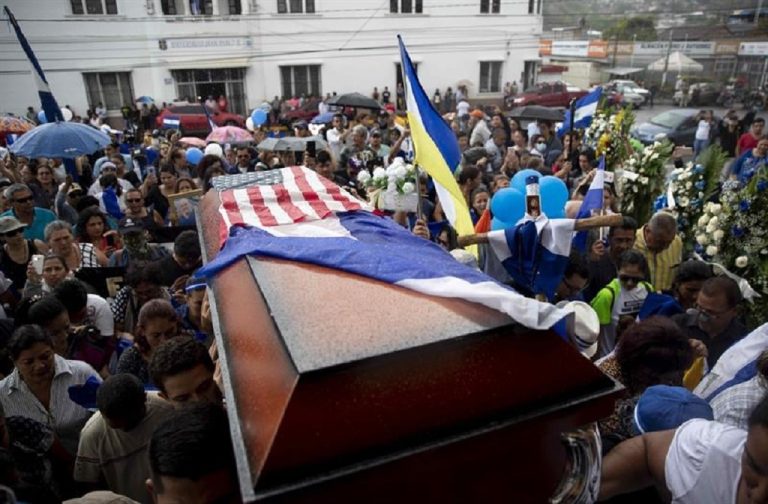7 de marzo 2023

Children of Exile: The Births “Sowing Hope” in the Camp of Nicaraguan Farmers

PUBLICIDAD 1M
PUBLICIDAD 4D
PUBLICIDAD 5D
Nicaragua’s dictatorship prevented them from visiting the country, but that did not stop them from conducting a thorough investigation.

Nicaragua’s dictatorship prevented them from visiting the country
The assertion was devastating. “All of Nicaragua is part of the crime scene,” said the German jurist Jan-Michael Simon, when presenting last Thursday, the revealing report of the Group of Human Rights Experts on Nicaragua, which he presides and which also includes Angela Maria Buitrago from Colombia and Chilean Alexandro Alvarez. However, not even the precise drama of the above phrase was able to synthesize the chain of horrors committed by the regime of Daniel Ortega and Rosario Murillo since April 2018. The document details with unquestionable precision, in addition to identifying those possibly responsible and proposing recommendations so that the violations and crimes do not go unpunished.
The report is the result of nearly a year’s work. The group, also known as GHREN, was established by the United Nations Human Rights Council on March 31 last year. It gave it the mandate to investigate “all human rights violations and abuses committed in Nicaragua since April 2018” to “contribute to accountability and access to justice for victims.” The Nicaraguan dictatorship prevented them from visiting the country, but this did not stop the group from conducting a thorough investigation, which included the analysis of 142 cases, the examination of multiple documents and interviews with victims, relatives, former government officials and witnesses.
The systematic human rights violations and abuses summarized in its 19 pages constitute a chilling repertoire of perversions. The text mentions “extrajudicial executions, arbitrary detentions, torture and cruel, inhumane or degrading treatment, arbitrary deprivation of nationality and violations of the right to remain in one’s own country, as well as the right to participate in public affairs and the freedom of expression, opinion, association, assembly, conscience and religion.”
These acts, it adds, constitute “a systematic and widespread attack against a civilian population, through a discriminatory policy that includes the commission of human rights violations and crimes under international law” and that “make it possible to assert the existence of crimes against humanity.”
Its dimension is so serious that Simon, in statements given on Thursday, compared it with the horrors committed by Hitler’s regime in Germany. “All the elements that you see in Nicaragua, unfortunately, can be seen in the Nuremberg trials,” he said, in reference to the atrocities revealed during the trials of Nazi criminals after World War II.
In addition to investigating the facts, the group inquired about possible perpetrators. It concluded that there are “reasonable grounds to believe that authorities at the highest level of the state structure,” including Ortega, Murillo, and “high-level commanders of the National Police headquarters, participated in carrying out the documented crimes.” The police and prison chiefs “knew or should have known about the crimes and violations committed by their subordinates.” However, “they did not take preventive and punitive measures, despite having the effective capacity to do so.”
The aforementioned, states GHREN, not only implies “the responsibility of the Nicaraguan state,” but also the “individual criminal responsibility” of those responsible, whether “under international criminal law,” or according to “the criminal types in Nicaraguan legislation or that of third countries.” Since Nicaragua does not recognize the jurisdiction of the International Criminal Court, the possibility of going to this court is excluded. However, the domestic legislature of some countries recognizes the principle of “universal jurisdiction” in cases of human rights violations, which would eventually allow individual prosecutions for crimes against humanity committed by Nicaraguans in Nicaragua.
Therefore, one of the experts’ recommendations to the international community is “to initiate legal actions against the individuals responsible for documented violations, abuses and crimes, in accordance with their domestic legislation.” At the same time, it requests that sanctions be extended to “institutions and individuals” involved in them, and urges that, when negotiating cooperation and investment projects in Nicaragua, the governments and organizations involved include human rights guarantees and give priority to “actions aimed at improving the situation” in the country.
In short, this solid document, apart from its multiple revelations of facts and perpetrators, offer a roadmap to build a real obstacle to the impunity enjoyed so far by the Nicaraguan dictators and their cronies. Justice must prevail. It is up to us to make it a reality, with determination and without delay.
*Editorial published in the newspaper La Nación of Costa Rica.
—–
This article was originally published in Spanish in Confidencial and translated by Havana Times
PUBLICIDAD 3M
Diario costarricense, fundado en 1946. Su primera versión electrónica (nación.com) se publicó en abril de 1995. Desde junio de 2015 implementa un sistema de suscripción digital.
PUBLICIDAD 3D